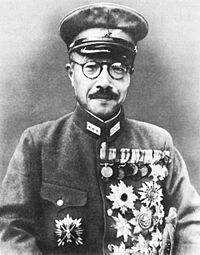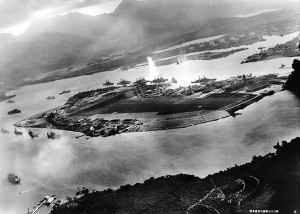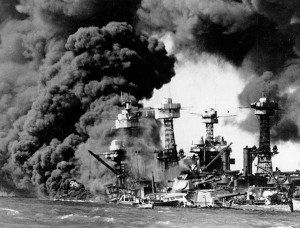 Underestimating…it can be inconvenient, sad, or devastating…but, it’s always a mistake. On September 24, 1941, the United States was right in the middle of underestimating Japan. Relations between the United States and Japan were deteriorating. Japan had occupied Indo-China and was now implicitly menacing the Philippines, a country the United States was protecting. The American reaction was to seize all Japanese assets in the United States and closed the Panama Canal to any Japanese shipping. Then in September of 1941, Roosevelt issued a statement, which had been drafted by British Prime Minister Winston Churchill, that threatened war between the United States and Japan should the Japanese make any further movement in territories in Southeast Asia or the South Pacific.
Underestimating…it can be inconvenient, sad, or devastating…but, it’s always a mistake. On September 24, 1941, the United States was right in the middle of underestimating Japan. Relations between the United States and Japan were deteriorating. Japan had occupied Indo-China and was now implicitly menacing the Philippines, a country the United States was protecting. The American reaction was to seize all Japanese assets in the United States and closed the Panama Canal to any Japanese shipping. Then in September of 1941, Roosevelt issued a statement, which had been drafted by British Prime Minister Winston Churchill, that threatened war between the United States and Japan should the Japanese make any further movement in territories in Southeast Asia or the South Pacific.
The Japanese had dominated Japanese foreign affairs for a long time…probably the biggest problem. The US Secretary of State, and Japan’s counterpart were trying to  ease tensions between the two countries, but Hideki Tojo, the minister of war, later to become the prime minister, had not intentions of leaving the territories Japan had captured. He viewed the Americans as a “threat” to his plan, and considered their attempts an ultimatum. So began his plans to strike the first blow in a Japanese-American confrontation…the bombing of Pearl Harbor.
ease tensions between the two countries, but Hideki Tojo, the minister of war, later to become the prime minister, had not intentions of leaving the territories Japan had captured. He viewed the Americans as a “threat” to his plan, and considered their attempts an ultimatum. So began his plans to strike the first blow in a Japanese-American confrontation…the bombing of Pearl Harbor.
On this day, September 24, 1941, Japanese consul in Hawaii, Nagai Kita was instructed to divide Pearl Harbor into five zones. He was also told to determine the number of warships moored in each zone and report back to Japan. The Japanese did not know that the Americans had intercepted the message. The problem was that it had to be sent back to Washington DC for decrypting. At that time in history, flights from  Hawaii to the mainland were infrequent. Remember that we didn’t have jumbo jets then. Most people traveled by ship, and so did the mail. The coded message was sent by sea, and finally reached the capital, but with staffing shortages, the decrypting was delayed until mid-October. It looked like a discarded plan the Japanese had, and since nothing had happened at Pearl Harbor, apparently the Japanese must have determined that it would not work. It was presumed to be an old message that held no possible importance after so long a time had passed. On December 7, 1941, the Americans would realize just how wrong they had been. With the bombing of Pearl Harbor, the importance of the message and the plan would be revealed.
Hawaii to the mainland were infrequent. Remember that we didn’t have jumbo jets then. Most people traveled by ship, and so did the mail. The coded message was sent by sea, and finally reached the capital, but with staffing shortages, the decrypting was delayed until mid-October. It looked like a discarded plan the Japanese had, and since nothing had happened at Pearl Harbor, apparently the Japanese must have determined that it would not work. It was presumed to be an old message that held no possible importance after so long a time had passed. On December 7, 1941, the Americans would realize just how wrong they had been. With the bombing of Pearl Harbor, the importance of the message and the plan would be revealed.


One Response to The Plan